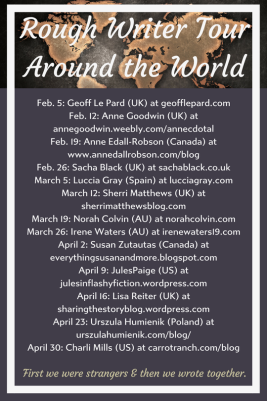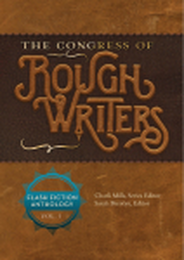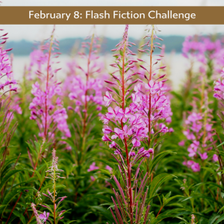| A couple of months ago I was privileged to attend a meeting of a local writing group in their “invited author” slot. As well as speaking about my own writing and journey to publication, I was asked to set a writing exercise. Given that I’d inadvertently begun both my published novels with a character descending a staircase, it wasn’t difficult to find my prompt, to which the writers responded admirably. But, as a practitioner of the 99-word story, I thought I could give them a little more by modelling writing less. |
| I was already writing flash fiction when Norah Colvin introduced me to Charli Mills’ Carrot Ranch. But, since in my head flash fiction could run to 1000 words, I was sceptical about telling a story in less than a tenth of that number. I sensed a similar scepticism among the members of the writing group when I mentioned the 99-word story. Yet a single example was enough to convince them it could be done! |
Twin stone staircases led to a wooden door, the numbers 1873 embossed above, grand as the entrance to a castle. At school I’d learn to read, and never have to go without a story. I’d mount those steps like a fairytale princess, entering one day by the left side, the next the right.
I didn't realise the letters above the stairs spelt BOYS on one side and GIRLS on the other. That my mother would laugh, plead, then slap me on the legs and hoist me up like a sack of coal when I raced towards the wrong one.
There’s no doubt that reducing this scene to 99 words helped pave the way for my publisher’s edits. However, I think the 99-word model (at least how I use it) is a little too tight for a novel where the reader needs a little space to breathe. Indeed, the published version contains an extra two sentences between the paragraphs above. But that’s not an argument against pruning. Unlike plants or hair, when you’ve chopped too many words from a piece of writing you can always put some back.
| Almost every week for the past four years (?), Charli Mills has produced an online compilation of 99-word stories inspired by the previous week’s theme. Now she’s gone a step further: assisted by editor Sarah Brentyn, she has taken some of her first-year favourites, along with some longer stories and essays, and made them into a book. I’m proud to be part of it and of the worldwide blog tour that will hopefully bring it to more readers’ attention. It’s available now in print and e-book versions: via book baby; Amazon Digital; Amazon print. |
| The latest flash fiction challenge presents me with a dilemma: I’m asked to write a 99-word story about fireweed. Now, I’ve read about fireweed, but imagined something different to the rosebay willowherb depicted here. So, once again, I’ve learnt about how English mutates across continents. Should I write about that? Let’s see: |
After lunch, I followed the other kids to the wasteground behind the … parking lot (not car park). I could still taste the new words I’d learnt at the table – eggplant; zucchini; rutabaga – as I loaded my arms with logs. My classmates smirked as they glanced my way, but I imagined Mum (Mom) reminding me I wouldn’t be new for ever.
“So what’s this?” said Miss Mills.
“Firewood. Like you asked for.”
She smiled as she stuck a bunch of rosebay willow herb in a jar. “I asked for fireweed. But don’t worry, you’ll learn English soon.”

























 RSS Feed
RSS Feed





















